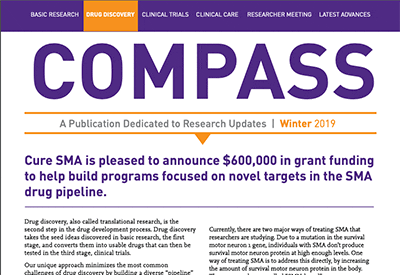Cure SMA has awarded a $140,000 research grant to Francesco Lotti, PhD, at Columbia University, for his project, “Role of Sumoylation in SMN Function and SMA Pathology.”
Survival motor neuron (SMN) protein is critical to the function of the nerves that control our muscles. We know that individuals with spinal muscular atrophy don’t correctly produce this protein at high enough levels, so researchers are working to sharpen our knowledge of this important protein and how it impacts those with SMA. Through their research, we’re learning more about how the SMN protein functions and how other cells and tissues respond to the loss of SMN protein.
Dr. Lotti’s project will look specifically at modifications that are made to SMN protein after it is created (called post translational modifications or PMTs) to see what effect they might have.
Meet Francesco Lotti
Who are you?
Modeling human disease to understand pathological mechanisms has been the focal point of my scientific career. To date, I have studied the mechanisms that regulate gene expression, with a particular emphasis on target identification and design of therapeutic interventions. To reach this goal, I employ cell and animal models as well as a wide range of biochemical, molecular and cell biological methodologies.
How did you first become involved with SMA research?
Since 2003, I have been studying SMA and the functions of the disease gene product SMN. As a postdoc in the Dreyfuss’ laboratory at the University of Pennsylvania, I contributed to the discovery that SMN deficiency results in changes to the cell’s splicing machinery, particularly to a cellular complex called small ribonuclear proteins. More recently as a Junior Faculty at Columbia University, I identified splicing events caused by the loss of SMN that are essential for motor neuron function , and I have directly linked their disruption to dysfunction in animal models of SMA. These findings revealed disruption of splicing as one mechanism contributing to SMA pathology.
What is your current role in SMA research?
A prominent conundrum in SMA research is how SMN deficiency in all tissues leads to selective neuronal dysfunction. My work focuses on the downstream events on discovering the changes that occur in RNA splicing due to the loss of SMN. Beyond providing fundamental insights into RNA metabolism and motor neuron biology, this effort aims to unravel the molecular defects underlying the loss of SMN and to develop appropriate therapeutic strategies based on these discoveries.
What do you hope to learn from this research project?
The identification of biological pathways that regulate SMN function is critical in revealing strategies for SMA therapy. However, little is known about the modifications to the SMN protein after it is made (called post translational modifications or PMTs) or how PMTs control SMN function. This project will investigate the hypothesis that PMTs of the SMN protein regulate SMN cellular functions.
How will this project work?
The team will investigate the requirement of PMTs in SMN protein function using well-established cell and mouse model systems of SMA. Our goal is to determine whether PMTs are required for the SMN protein to work correctly.
What is the significance of your study?
Successful completion of this project will reveal the role of PMTs in the regulation of SMN biology. In addition, to the importance to unraveling novel regulatory networks that control fundamental cellular processes, importantly this project also has the potential to link PMTs of the SMN protein to SMA pathology.
Basic Research Funding
This grant to Dr. Lotti is part of $640,000 in basic research funding that we’ll be announcing over the next few weeks. We’ll profile each of the researchers who’ve received a grant, and share how their work can benefit those affected by SMA.
Basic research is the first step in our comprehensive research model. We fund basic research to investigate the biology and cause of SMA, in order to identify the most effective strategies for drug discovery.



